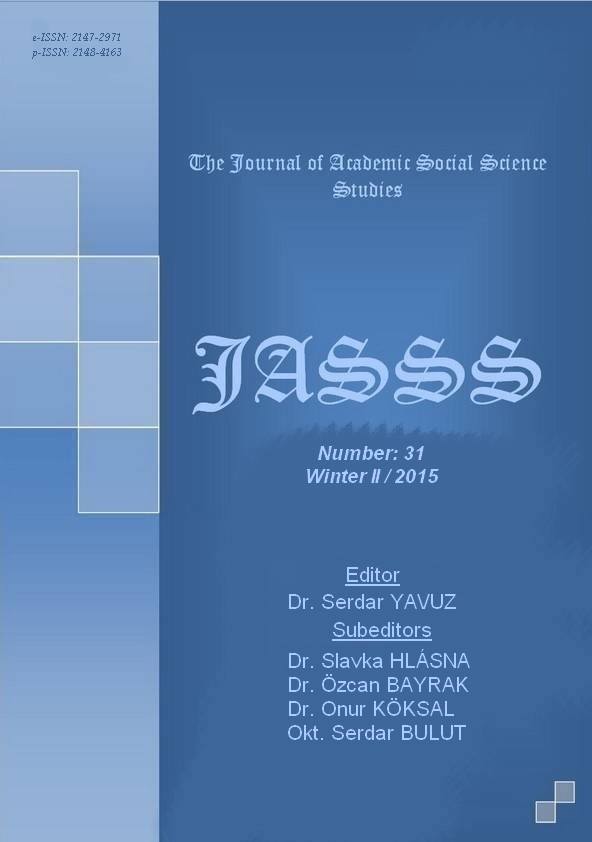MÜZİK EĞİTİMİ ANABİLİM DALI 4. SINIF ÖĞRENCİLERİNİN PİYANO DERSİNE KARŞI TUTUMLARININ EŞLİK DERSİ BAŞARI DURUMLARI İLE KARŞILAŞTIRILMASI
Author :
Abstract
Bu araştırmada; Üniversitelerin Eğitim Fakültesi Güzel Sanatlar Eğitimi Bölümü (G.S.E.B) Müzik Eğitimi Anabilim Dalı (A.B.D) 4. sınıf öğrencilerinin, piyano dersine karşı tutumlarının ölçülmesi ve bu tutumların, aynı öğrencilerin eşlik çalma dersi başarı durumları ile ilişkisinin incelenmesi ve karşılaştırılması hedeflenmektedir. Araştırmaya Pamukkale Üniversitesi, Uludağ Üniversitesi, Balıkesir Üniversitesi Eğitim Fakültesi GSEB Müzik Eğitimi A.B.D’na devam eden 70 öğrenci katılmıştır. Araştırmada SPSS 16 paket programı kullanılarak değişkenler arası korelasyon katsayısı hesaplanmıştır. Öğrencilerin piyano dersine karşı tutumlarının belirlenmesinde, Tufan ve Güdek’in (2008) geliştirmiş olduğu “Piyano Dersine Yönelik Tutum Ölçeği” kullanılmıştır. Verilerin analizinde, öğrencilere uygulanan piyano dersine karşı tutum ölçeğinin sonuçları ile eşlik çalma dersi başarı durumları arasındaki ilişkiyi belirlemek üzere Pearson Korelasyon katsayısı hesaplanmıştır. Bu doğrultuda öncelikle, piyano dersine karşı tutum ölçeği puanları ve eşlik dersi notlarının betimsel istatistik değerleri hesaplanmıştır. Sonrasında, bu iki toplam puanın Pearson korelasyon katsayısı hesaplamaya uygun olup olmadığı ve normallik sayıltısını test etmek amacı ile Kolmogorov-Smirnov z testi yapılmıştır. Bu çalışma, piyano dersi ile bu dersle bağlantılı olduğu düşünülen eşlik çalma dersinin ilişkisinin ortaya konulması ve bu alanda yapılacak çalışmalara sağlayacağı katkı açısından önemli görülmektedir. Araştırma sonucunda öğrencilerin piyano dersine karşı tutumlarının olumlu yönde olduğu görülmüştür. Piyano dersine karşı tutumun, eşlik çalma dersi başarı puanları ile ilişkisi 0’a yakın çıkmış olup, eşlik çalma dersi ile piyano dersi tutumu arasında bir ilişki görülmemiştir.
Keywords
Abstract
In this study; it was aimed to find out the attributions of fourth grade students at Faculty of Education Music Education Department towards Piano Courses, and the relationship and comparison between attitude and success and failure of Correpetition Course. 70 students who study in 3 different universities, which are Pamukkale University, Uludag University and Balıkesir University Faculty of Education Department of Music Education took part in the study. SPSS 16 was used in the study and correlation scale was calculated, and to find out the attitudes of the participants towards Piano Courses, “The Attitude Scale Towards Piano Courses”, which was developed by Tufan and Gudek (2008) was used in the study. In data analysis, Pearson's correlation coefficient was calculated to determine the relationship between the results of attitude scale towards piano courses applied to the students and success of the correpetition course. In this regard, first, the descriptive statistics value of the attitude scale scores towards the piano courses and success of correpetition course were calculated. Afterwards, Kolmogorov-Smirnov Z test was applied in order to find out whether two total scores are appropriate to calculate the Pearson correlation coefficient and to test the assumption of normality. The study is significant in terms of finding out the relationship between piano courses and correpetition courses, and its contribution to the studies which will be conducted in this area. As the findings of the study, it was found that the students have positive attitude towards piano courses. The relationship between the attitude towards piano courses and the success in correpetition course grades was found as nearly 0, and it can be concluded that there is no relationship between the attitude towards piano courses and the success in correpetition course grades.
